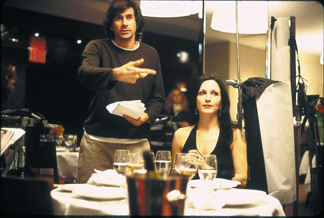Tadpole
The kids these day
By Matt Mulcahey

Don't look at me, look at her. He's right, I'm a freak.
15-year-old Oscar Grubman is determined to reveal his love to the woman he pines for. There are two problems. One, she is middle-aged. Two, she is his stepmother.
With Maribel Verdu the center of a jailbait sandwich in Y Tú Mama Tambien and Jake Gyllenhaal doing the menopause mambo with both Jennifer Aniston in The Good Girl and Catherine Keener in Lovely and Amazing, this has been the year of the female pedophile in independent film.
When it comes to such things a double standard has always existed, with a 40-year-old man and a teenage girl earning jail time, while a 40-year-old woman and a teenage boy gets the kid a few high fives. If the genders were reversed Tadpole probably wouldn't be making the rounds on the art-house circuit (just ask Adrian Lyne), but since Kevin Spacey made lusting after adolescents acceptable (at least in the land of cinema), Tadpole's seemingly seedy storyline barely raises a flicker of surprise.
Home for a long Thanksgiving Weekend from Chauncey Academy, a prestigious prep school with a pipeline to the Ivy League, Oscar (Aaron Stanford) decides it's finally time to pledge his undying love and devotion to his step-mother Eve (Sigourney Weaver). Unable to muster the courage at his Columbia history professor father's (John Ritter) pre-Thanksgiving bash, Oscar heads to a bar, gets hammered, loses his wallet, and ends up in bed with Eve's best friend, Diane (Bebe Neuwirth).
Petrified that word of his one-night stand with Diane will make its way around to Eve, Oscar spends the rest of the weekend trying to keep Diane from opening her mouth while attempting to spill the contents of his heart to Eve.
Shot on digital video in less than two weeks for less than $1 million, Tadpole's premise itself may disturb some and the film's failure to judge its characters (assigning no negative connotations to a 15-year-old drinking and sleeping with older women) might off-put others. When Tadpole is viewed without the diverse considerations of morality it is an extremely amiable, intelligent comedy held together by co-writer/director Gary Winick's light-hearted tone and the effortlessly natural performance of Stanford in the role of Oscar.
While Ritter returns to fine comic form, Weaver continues to find solace from Hollywood Ageism by seeking out challenging roles in smaller films and Neuwirth, criminally underused in film for years, steals all of the scenes as an unrepentant seductress, it is Stanford who carries the movie.
Stanford makes Oscar a believable object of mature women's desire not because of any carnal physical desire, but because of his passion for life, undiminished by the cynicism of adulthood. Though the obvious parallel to Stanford's performance is Jason Schwartzman's work in Rushmore, his Oscar is less quirk and more depth than Schwartzman's Max Fisher, somehow managing to pull off a mixture of James Dean-like tortured youth and the bookish intellectual charm of a young Woody Allen.
23-years-old at the time of filming, Stanford manages to make Oscar, a 15-year-old prodigy fluent in French, obsessed with Voltaire, and completely convinced that girls his age have nothing to offer because they "haven't lived enough," a completely realistic and normal character.
HOME | THIS ISSUE | ACE ARCHIVES